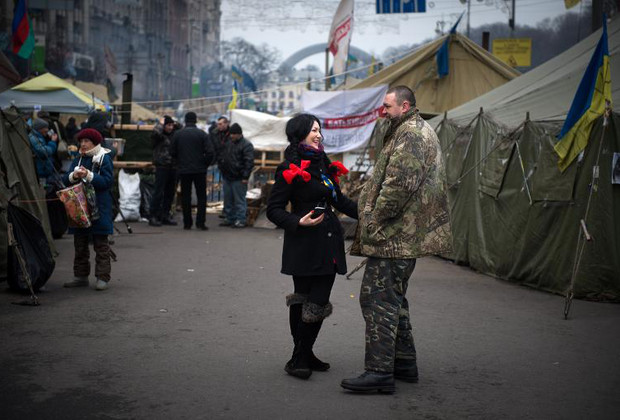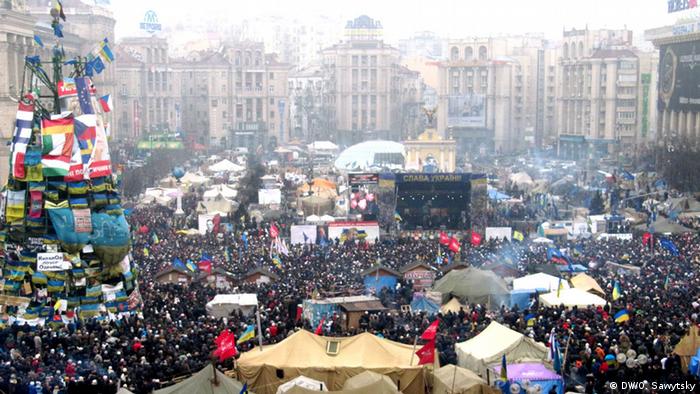Ukraine protesters offer goodwill
gesture after detainees freed
Protesters occupying Kiev city hall said Saturday they stood "ready" to vacate the premises, in a gesture of goodwill after authorities released all those detained in the anti-government unrest rocking the country.
The "headquarters of the revolution" since the protest movement rocking Ukraine began more than two months ago, the building is highly symbolic and the last-minute concession comes ahead of a fresh, mass demonstration due on Sunday.
But in a strongly-worded interview, jailed opposition icon Yulia Tymoshenko warned that nothing short of the resignation of President Viktor Yanukovych would satisfy protesters, who are up in arms over his decision to ditch an EU pact in favour of closer ties with Russia.
Speaking to AFP Saturday, Yuriy Syrotyuk, the number two of the nationalist Svoboda (Freedom) party that controls the occupied city hall, said protesters stood "ready" to evacuate, and could do so "in a few minutes, at most half-an-hour" if the green light was given.
The evacuation of the building was one of the conditions set by authorities as part of an amnesty law that stipulates all detained protesters will be freed -- but only if some parts of the Ukrainian capital are vacated.
The law was approved by Yanukovych at the beginning of February after protests in Kiev turned deadly, shocking the country and prompting the shaken president to start negotiating with the opposition.
On Friday, authorities announced they had freed all 234 detained members of the protest movement, adding that charges against them would also be dropped if conditions of the amnesty were met.
Some of them have been charged with fomenting mass unrest, which carries a sentence of up to 15 years in jail.
The move -- welcomed by the United States -- appeared to be a concession from the government in a bid to ease tensions, and Yanukovych himself promptly appealed to the opposition to yield some ground too.
- Yanukovych must go -
City hall, which is on the main Khreshchatyk avenue in central Kiev, was stormed by protesters on December 1 following a brutal crackdown on demonstrators the previous night.
It is run with military precision, and houses hundreds of protesters who sleep there to get out of the biting cold and gather for meetings, English lessons and other activities.
And while the opposition has still not unanimously agreed to vacate the building, most members support the move, Syrotyuk said.
Arseniy Yatsenyuk, one of the three main opposition leaders, said in a statement that protesters would remain on Kiev's occupied Independence Square and in other public buildings, but tellingly made no mention of city hall.
The opposition has also agreed to vacate "part" of Gruchevsky street, where the deadly riots took place at the end of January, to allow traffic to move freely.
But as protesters geared up for the mass demonstration on Sunday due at 1000 GMT -- the 11th since the unrest began -- Tymoshenko said that Yanukovych must go.
"The only subject of negotiation with Yanukovych is the conditions of his departure," the former prime minister who was imprisoned in 2011 said in an interview with weekly Dzerkalo Tyzhnia.
In city hall, Commander Ruslan Andryko of the protest movement said as much, noting that while they may vacate the building, "the revolution has only just started."
For her part, Tymoshenko accused Yanukovych of having become a puppet of Russian President Vladimir Putin, saying Ukraine had lost the independence it gained from the Soviet Union in 1991.
Beyond the domestic resonance of the anti-government protests, Yanukovych's decision to ditch the EU pact has morphed into a wider, geopolitical tussle over the future of Ukraine between Russia and the West.
"Our European friends believe that after long negotiations and loans they can bring Yanukovych back onto the European road," Tymoshenko said.
"They will not be able to do that. Because it's not Yanukovych who decides, but Putin.
"We must get rid of Ukraine's president who no longer takes independent decisions, in a legal manner", she said, adding that global players now perceived Ukraine as "Russia's minority partner."
UKRAINE
Ukrainian authorities release detained protesters
The Ukrainian authorities have released hundreds of detained protesters, fulfilling one of the opposition's major demands. Embattled President Viktor Yanukovych is now calling on the opposition to compromise.
In an apparent concession to the opposition, Ukrainian Attorney General Viktor Pshonka announced the release of 234 protesters from custody on Friday, two days ahead of a planned mass, anti-government rally in Kyiv's Independence Square.
Pshonka said that the charges against the protesters would be dropped if the conditions of the new amnesty law are met. The law offers amnesty to detained protesters only if the opposition agrees to vacate all of the government buildings it has occupied.
In a televised interview on Friday, President Viktor Yanukovych called on the opposition to make concessions, saying that he does not want to "wage war."
"I want to safeguard the state and resume a stable development," Yanukovych said. "We are asking the opposition to also make concessions."
Under pressure from the mass demonstrations, Yanukoych sacked his government last month and offered key positions to opposition politicians. But the opposition says that they will not abandon their posts until the president resigns.
"The only subject of negotiation with Yanukoych are the conditions of his departure," said former Prime Minister Yulia Tymoshenko in an interview with weekly Dzerkalo Tyzhnia. Tymoshenko, an opposition leader, was convicted of abuse of power in 2011 and sentenced to seven years in prison. The EU has criticized the conviction as politically motivated.
Meanwhile, Russian Foreign Minister Sergei Lavrov accused the EU on Friday of trying to extend its "sphere of influence" to Ukraine.
The protesters took to the streets in November, after President Yanukoych opted not to sign an association agreement with the European Union. Instead, he accepted a $15 billion loan from Russia.
 Ukrainian anti-government protesters Oleksandr and Halyna walks near the protesters tent camp after their wedding ceremony at Independence Square in Kiev February 15, 2014. — Reuters picKIEV, Feb 15 — Ukrainian authorities yesterday provisionally freed the last 234 detained protesters under an amnesty offer aimed at defusing protracted street unrest, but activists decried the move as a sham and pressed for further concessions.
Ukrainian anti-government protesters Oleksandr and Halyna walks near the protesters tent camp after their wedding ceremony at Independence Square in Kiev February 15, 2014. — Reuters picKIEV, Feb 15 — Ukrainian authorities yesterday provisionally freed the last 234 detained protesters under an amnesty offer aimed at defusing protracted street unrest, but activists decried the move as a sham and pressed for further concessions.
President Viktor Yanukovich’s government has fixed Monday as the deadline for all occupied municipal buildings to be cleared of protesters and barricades to be removed from city centre roads in the capital Kiev in exchange for the release of the detainees and a possible future pardon.
Yanukovich negotiated the amnesty offer through parliament to try to take the sting out of street protests in Kiev and elsewhere in Ukraine that have kept him on the back-foot since he spurned a trade pact with the European Union in November.
With much of downtown Kiev a fortified camp where hundreds of “Euro-maidan” activists keep up protests behind barricades and sandbags, Yanukovich wants to tamp down tension before he picks a new prime minister, possibly as early as next week.
But with protesters highly suspicious about virtually any offer from Yanukovich’s side, there seemed little chance of them relinquishing control of the streets by next week, though they said late yesterday that they might allow traffic to pass on the main road leading to government headquarters.
Though police released the last of 234 detained protesters yesterday, criminal charges have not been lifted against them.
They face prosecution at some point in the future for participating in “mass disorder” - a charge carrying a sentence of several years in prison - unless their comrades leave occupied buildings and clear blocked roads.
General prosecutor Viktor Pshonka said yesterday authorities would immediately begin considering dropping charges if buildings were cleared and key roads in the capital re-opened by Monday. But opposition parties and radical protesters, who clashed violently with police last month, said they wanted all charges dropped immediately.
“We have people being released from jail but kept under house arrest, that is to say they are deprived of their rights, and there is a criminal case hanging over each one of them. This is not an amnesty. This does not meet the conditions of the opposition,” Rostislav Pavlenko, a member of opposition leader Vitaly Klitschko’s party, Udar (Punch), was quoted as saying by the Russian news agency Interfax.
At least six people have been killed in clashes with riot police - unprecedented in the 22 years since Ukraine gained independence - since thousands of protesters rebelled against Yanukovich’s sudden move to snub the EU in favour of forging closer economic ties with former Soviet master Russia.
EAST-WEST RIVALRY
The crisis has triggered a geopolitical tussle between East and West: Russia is beckoning Yanukovich with an aid package to plug holes in Ukraine’s heavily-indebted economy while the United States and its Western allies have urged him to move back towards an IMF-backed deal with Europe.
The East-West rivalry flared anew yesterday when Russian Foreign Minister Sergei Lavrov, meeting Germany’s Frank-Walter Steinmeier in Moscow, accused the EU of seeking to create a “sphere of influence” on its borders.
“Dragging Ukraine to one side, telling it that it needs to choose ‘either or’, either with the EU or with Russia, (the European Union) is in fact trying to create such a sphere of influence,” Lavrov said.
There have been no street violence in Kiev for three weeks.
But Western governments are worried about an escalation of conflict and breakdown of law and order unless Yanukovich meets opposition demands to allow them to form a government that could act independently of him.
They are also pressing him to change the constitution, under which his powers would be reduced and which would mean presidential elections before the scheduled date in March 2015.
A pivotal decision will be who Yanukovich names as his candidate for prime minister to replace the Russian-born Mykola Azarov, whom he sacked on Jan. 28 in a vain attempt to appease the protesters.
He has until the end of the month to reach a decision although parliament speaker Volodymyr Rybak was quoted by Interfax yesterday as saying he thought Yanukovich might present his choice to parliament next Tuesday.
With the hryvnia under devaluation pressure, he has to find a new steward of the economy quickly. — Reuters pic









































No comments:
Post a Comment